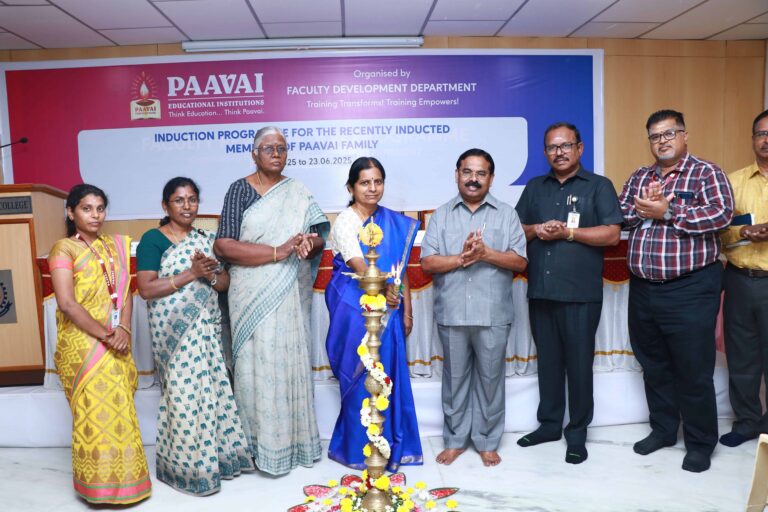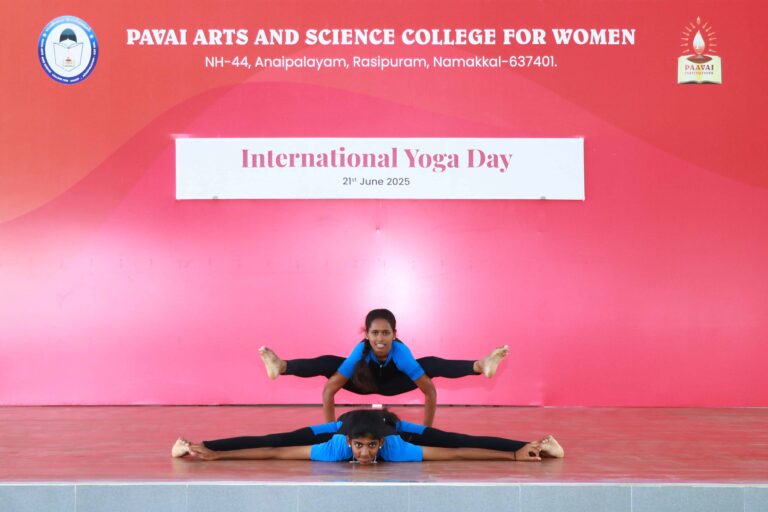-
IQAC
-
IQAC Objectives
-
Aqar PDF
-
Academic Audit Report
-
SSS
-
Strategic Planning and Process
-
IQAC Minutes & Action Taken
-
IQAC Annual Report
-
Feedback Systems
IQAC Members
 | PAAVAI ENGINEERING COLLEGE Internal Quality Assurance Cell (IQAC) |  |
| S.No | Category | Name | Designation |
| 1 | Management | Dr K K Ramasamy | Director Administration |
| 2 | Chair Person | Dr M Premkumar | Principal |
| 3 | Coordinator of IQAC | Dr K Sundara Murthy | Professor /Mechanical |
| 4 | Administrative Officers | Dr B Muralibabu | Professor & CoE |
| Prof M.Mohan | Professor/Chemistry | ||
| 5 | Teachers | Dr G Balaji | Professor & Head/EEE |
| Dr.B Venkatesan | Professor & Head/ IT | ||
| Dr R.Mohanapriya | Professor & Head/ECE | ||
| Dr A P Sivasubramaniam | Professor & Head /Mechanical | ||
| Dr D R P Rajarathnam | Professor & Head/MCT | ||
| Dr D Banumathi | Professor & Head /CSE | ||
| Dr.P.Muthusamy | Professor & Head/MCA | ||
| Prof K Sharmila Devi | Associate Professor & Head/Civil | ||
| Dr T Arunkumar | Professor & Head /Bio Medical | ||
| Dr A.Vivekanandhini | Associate Professor & Head /Agri | ||
| Dr R Arravind | Professor & Head /Aero | ||
| Dr R.Balasubramani | Professor & Head/Chemical | ||
| Dr.S.Dinakaran | Associate Professor & Head S&H | ||
| Dr G Raja | Professor / Chemistry | ||
| 6 | Local Society, Students and Alumni | Mr.Arun Prakasam | CEO, Extromind Technologies, Tiruchengode |
| Ms.N.S Chandalini | Final Year ECE | ||
| Mr.R Kishore | Final Year Mech | ||
| Mr Velmurugan Palanivel | Senior Software Engineer, Robert Bosch Engineering and Business Solutions, (Alumnus from IT Department) | ||
| 7 | Employer and Industrialist | Mr.R.Dhamodaran | HR/Admin Manager, Ital Plastic Compounds Pvt.Ltd, Chennai. |
| Mr Senthilkumar | Managing Director , Orbit Controls & Service Chennai. | ||
| Parent Member | Mrs.N.Anitha B.Sc., B.Ed., | Teacher, Modern Academy, Namakkal. |
IQAC Objectives
a) To develop a system for conscious, consistent and catalytic improvement in the performance of the institutions
b) To channelize the efforts and measures of the institution towards academic excellence
c) To internalize and institutionalize quality enhancement practices
d) To assure all the stakeholders about the quality education provided by the institution
e) To evolve a procedure for optimization and integration of modern methods of Teaching and Learning
f) To ascertain the credibility of evolution procedures
g) To promote the Research sharing and networking with other Institutions in India and Abroad
h) To emphasize the culture of Implementing Best Practices of the Institution
Best Practices
Best Practices-I
PADHA POOJA PERFORMED BY THE STUDENTS
1.1. Title of the Practice
Padha Pooja performed by the students to their parents and teachers.
1.2. Objectives of the Practice
- The distinctive point of the institution is to mould the students into a self-disciplined and respectable person in the
- To develop love and affection towards parents and
- To develop the habit of adherence to the elder
- To understand the sacrifice of their
- To realize the significance of the
- To develop in to a cultured
- To develop moral values and ethics into the
- To recognize the importance of hard work and work
- To share responsibilities among teachers and
- To develop among themselves a sense of social and civic
- To promote moral values and ethics in the students’
- To adopt themselves into societal norms and national norms.
- To make students to understand the rights and duties as a son and as a
- To satisfy the expectation of the parents and teachers so as to become the economically independent
1.3. The Context
The College has got its rich heritage of fostering the habit of padha pooja in students performed to their parents and teachers. Our country is rich in its tradition and culture. It is the responsibility of the institution to mould the personality of the students holistically and professionally for better future of the nation. The country is digitalized, and the technology plays a major role in shaping the community. The cognitive domain has been updated and improved; the affective domain is not at all given importance in the current scenario, so the children are deficient in expressing their emotions. Now the present generation of students are always engaged with the technology, they are not given importance to values like honesty, hard work, simplicity, respect, obedience and so on. Therefore, as an educational institution are temples of learning, it is very much necessary to inculcate the value system in the students for the peaceful society ahead.
1.4. The Practice
As our culture insists upon, Mathru devo bhava, Pithru Devo bhave, Acharys devo bhava and Athiti devo bhava. In order to inculcate this, Value Oriented practices such as Padha Pooja to parents during Induction programme and salutation to the teachers in the form of Padha Pooja on Teacher’s day are encouraged. Paavai Engineering College started to practice and adhere to this padha pooja, since inception of the college. It is said that the parents are the first teachers and teachers are considered to be the second parents. During inauguration of first year classes every year, all the parents of the first year students are invited. After the inaugural ceremony, the padha pooja is being done by the child of the respective parents. The parent’s feet is washed by their children and worshipped with the flowers. Parents in turn bless their children for the education and upliftment in their life. It was a heart touching sight and emotional, which makes both the children and parents in tears of joy. No child will forget that moment in their life.
Similarly, Padha pooja is being done by the students to their respective teachers on Teachers’ day Sept 5th of every year. The Teachers’ day function usually celebrated in a grand manner, where all teachers’ fraternity assemble in Aanadha Aranagam, an auditorium of 2500 seating capacity. The teachers were recognized for their performance. The final year students were called for doing Padha pooja, in the same way the teachers feet is washed and worshipped with flowers. Teachers profusely shower their choicest benediction to their students. It is usually an amazing glimpse to witness the situation
1.5. Evidence of Success
By practicing this, students naturally inculcate the value of gratefulness and respect towards their parents and teachers. This practice has a great effect on students to know about the great culture and tradition of our country. This gives an insight into the act of being human and the importance of adherence to Human Values. Padha Pooja makes the students to realize the responsibility as a son, student and as a future citizen of the country. The students are able to appreciate and exhibit their respect and regard to the culture of our traditional values. Many of the students expressed that this habit has a tremendous change in their character and personality development.
Best Practices-II
OUTREACH PROGRAMMES FOR RURAL COMMUNITY DEVELOPMENT
2.1. Title of the Practice
Outreach programmes for rural community development by adopting nearby five villages, which promotes the societal responsibility of the students to evolve as a best human being.
2.2. Objectives of the Practice
- The primary focus of the institution is to transform the students into an accountable person in the
- To build rural community with sustainable
- To work with the people of rural India in identifying development challenges and evolving appropriate solutions for accelerating sustainable
- To promote the rural areas through various activities such as seminar, awareness camp, rally ,
- To mobilize and decentralized the local resources
- To understand themselves in relation to their
- To develop among themselves a sense of social and civic
- To develop competence required for group-living and sharing of
- To Gain skills in mobilizing community
- To acquire leadership qualities and democratic
- To develop capacity to meet emergencies and national
- To practice national integration and social harmony.
The underlying principle of this practice is
- To promote rural community in terms of improving their awareness in health, sanitation, livelihood and education.
- To identify the needs of the rural community and supporting them by providing various activities to develop the community.
- To make students to understand the rights and duties of the citizen and to emerge as a socially responsible citizen.
2.3. The Context
The College has got its rich heritage of fostering the habit of rendering service to the local and national community. The students are motivated to participate, involve and extend their service towards humanity. All the outreach activities are aimed to improve the holistic personality of the students. The various activities are planned and implemented through National Service Scheme (NSS) of the college. The interactions and exchange of good will of the people provide the students a sense of sympathy and empathy. The college efficiently works towards the development of the students in an academic context and also gives equal importance to these outreach activities. These training, exposure and involvement of students have provided them the experience of social living. These activities are required for every individual student to claim his/her desired attitudes. The students move towards the desired goals progressively.
2.4. The Practice
The practice of adopting five villages from the society is with the objective of cultivating ‘Service to mankind is to service to God’ in students. The villages are Natamangalam, Semmampatti, Thathayangarpatti, Erukkapalayam and Puliampatti. This practice shapes the student’s community to emanate as a problem identifier and problem solver of his or her own community. These outreach activities are carried out since the inception of the college. Paavai engineering College has National Service Scheme(NSS) team with faculty head as NSS Programme officer, with his team members. The office bearers are selected from the student representative and nominated as President, Vice-president and secretary. The whole team consists of 100 NSS volunteers. The cardinal principle of the NSS programme is that the students and teachers combined together in community service and get a sense of involvement in the tasks of nation building. From 2015onwards there are two types of activities are organized, they are regular activities and special camp activities.
Regular activities of National Service Scheme of the college: The college has adopted five villages and service is extended to promote education of the poor, repairing schools, household survey, village survey, awareness camp on health and hygiene, road safety awareness, cleaning of the village and temples. House hold survey has been done with the objective of identifying the water facility, electricity facility, gas facility of each individual house and village survey has been done to identify the transport and road facility. The report has been submitted to the district collectorate for further action. Along with the adoption of village, NSS activities includes functional literacy and non- formal education, Tree plantation, Participate in Republic day parade, preservation and up keeping of trees, construction and repair of roads, painting of school walls, cleaning of village ponds and wells, health education and primary health care, first aid awareness, blood donation, AIDS awareness, advocating advanced agricultural practice, disaster management (Cyclones, floods), women empowerment, road safety, afforestation, blood donation, plastic eradication, and celebration of days of national importance and so on.
Special camp activities of the college: The special camp activities are conducted once in a year. The activities constitute free medical camp, talk on cyber-crime and security, programme on women empowerment, awareness rally on disposal of plastic usage, Eye check-up camp, health awareness rally, Swacch Bharat mission (Clean India Mission), awareness on following traffic rules, organic farming awareness rally, Yoga and natural medicine camp and so on. These activities are planned and implemented regularly as a part of social activities to contribute towards the betterment of the society.
The practice is unique, since it bestows the best education to the students’ community as it is participatory learning and experiential learning.
2.5. Evidence of Success
The rural community is benefitted from these programmes. The village people expressed their willingness to accept and allowed the college to conduct many programmes in their village. The students are benefitted by these activities to develop their holistic personality. The students and NSS programme officer have achieved many awards, recognition, and appreciation on account of their tireless service.
- Anna University Level Award – NSS Best Volunteer Award for four consecutive years (from 2015-2019).
- Best NSS Programme Officer Award from Anna University for the year 2018-2019.
- Republic Day Parade Camp-, New Delhi-Our students have participated in Republic Day Parade for consecutive years (2017,2018 and 2020).
- Two of our students have participated State Republic Day Parade-2019.
- Two of our students Participated NSS National Integration Camp at Alagappa Chettiar College of Engineering & Technology,
- Our students have participated in Indian Student Parliament-2018 & 2019, Organized by MIT School of Government, MIT World Peace University,
- Two of our students have participated in 22nd National Youth Festival Noida,
- Three of our students participated in National youth development, held in
- 14 students Participated in National Youth Camp-2019 organised by National Institute of Culture and Education, Wardha.
2.6. Problems Encountered and Resources Required
There are not major issues, sometimes there is a hesitation from the village people to co- operate with the NSS team. Sometimes students have conventional idea about blood donation and health related matters.
Best Practices-I
PADHA POOJA PERFORMED BY THE STUDENTS
1.1. Title of the Practice
Padha Pooja performed by the students to their parents and teachers.
1.2. Objectives of the Practice
- The distinctive point of the institution is to mould the students into a self-disciplined and respectable person in the
- To develop love and affection towards parents and
- To develop the habit of adherence to the elder
- To understand the sacrifice of their
- To realize the significance of the
- To develop in to a cultured
- To develop moral values and ethics into the
- To recognize the importance of hard work and work
- To share responsibilities among teachers and
- To develop among themselves a sense of social and civic
- To promote moral values and ethics in the students’
- To adopt themselves into societal norms and national norms.
- To make students to understand the rights and duties as a son and as a
- To satisfy the expectation of the parents and teachers so as to become the economically independent
1.3. The Context
The College has got its rich heritage of fostering the habit of padha pooja in students performed to their parents and teachers. Our country is rich in its tradition and culture. It is the responsibility of the institution to mould the personality of the students holistically and professionally for better future of the nation. The country is digitalized, and the technology plays a major role in shaping the community. The cognitive domain has been updated and improved; the affective domain is not at all given importance in the current scenario, so the children are deficient in expressing their emotions. Now the present generation of students are always engaged with the technology, they are not given importance to values like honesty, hard work, simplicity, respect, obedience and so on. Therefore, as an educational institution are temples of learning, it is very much necessary to inculcate the value system in the students for the peaceful society ahead.
1.4. The Practice
As our culture insists upon, Mathru devo bhava, Pithru Devo bhave, Acharys devo bhava and Athiti devo bhava. In order to inculcate this, Value Oriented practices such as Padha Pooja to parents during Induction programme and salutation to the teachers in the form of Padha Pooja on Teacher’s day are encouraged. Paavai Engineering College started to practice and adhere to this padha pooja, since inception of the college. It is said that the parents are the first teachers and teachers are considered to be the second parents. During inauguration of first year classes every year, all the parents of the first year students are invited. After the inaugural ceremony, the padha pooja is being done by the child of the respective parents. The parent’s feet is washed by their children and worshipped with the flowers. Parents in turn bless their children for the education and upliftment in their life. It was a heart touching sight and emotional, which makes both the children and parents in tears of joy. No child will forget that moment in their life.
Similarly, Padha pooja is being done by the students to their respective teachers on Teachers’ day Sept 5th of every year. The Teachers’ day function usually celebrated in a grand manner, where all teachers’ fraternity assemble in Aanadha Aranagam, an auditorium of 2500 seating capacity. The teachers were recognized for their performance. The final year students were called for doing Padha pooja, in the same way the teachers feet is washed and worshipped with flowers. Teachers profusely shower their choicest benediction to their students. It is usually an amazing glimpse to witness the situation
1.5. Evidence of Success
By practicing this, students naturally inculcate the value of gratefulness and respect towards their parents and teachers. This practice has a great effect on students to know about the great culture and tradition of our country. This gives an insight into the act of being human and the importance of adherence to Human Values. Padha Pooja makes the students to realize the responsibility as a son, student and as a future citizen of the country. The students are able to appreciate and exhibit their respect and regard to the culture of our traditional values. Many of the students expressed that this habit has a tremendous change in their character and personality development.
Best Practices-II
OUTREACH PROGRAMMES FOR RURAL COMMUNITY DEVELOPMENT
2.1. Title of the Practice
Outreach programmes for rural community development by adopting nearby five villages, which promotes the societal responsibility of the students to evolve as a best human being.
2.2. Objectives of the Practice
- The primary focus of the institution is to transform the students into an accountable person in the
- To build rural community with sustainable
- To work with the people of rural India in identifying development challenges and evolving appropriate solutions for accelerating sustainable
- To promote the rural areas through various activities such as seminar, awareness camp, rally ,
- To mobilize and decentralized the local resources
- To understand themselves in relation to their
- To develop among themselves a sense of social and civic
- To develop competence required for group-living and sharing of
- To Gain skills in mobilizing community
- To acquire leadership qualities and democratic
- To develop capacity to meet emergencies and national
- To practice national integration and social harmony.
The underlying principle of this practice is
- To promote rural community in terms of improving their awareness in health, sanitation, livelihood and education.
- To identify the needs of the rural community and supporting them by providing various activities to develop the community.
- To make students to understand the rights and duties of the citizen and to emerge as a socially responsible citizen.
2.3. The Context
The College has got its rich heritage of fostering the habit of rendering service to the local and national community. The students are motivated to participate, involve and extend their service towards humanity. All the outreach activities are aimed to improve the holistic personality of the students. The various activities are planned and implemented through National Service Scheme (NSS) of the college. The interactions and exchange of good will of the people provide the students a sense of sympathy and empathy. The college efficiently works towards the development of the students in an academic context and also gives equal importance to these outreach activities. These training, exposure and involvement of students have provided them the experience of social living. These activities are required for every individual student to claim his/her desired attitudes. The students move towards the desired goals progressively.
2.4. The Practice
The practice of adopting five villages from the society is with the objective of cultivating ‘Service to mankind is to service to God’ in students. The villages are Natamangalam, Semmampatti, Thathayangarpatti, Erukkapalayam and Puliampatti. This practice shapes the student’s community to emanate as a problem identifier and problem solver of his or her own community. These outreach activities are carried out since the inception of the college. Paavai engineering College has National Service Scheme(NSS) team with faculty head as NSS Programme officer, with his team members. The office bearers are selected from the student representative and nominated as President, Vice-president and secretary. The whole team consists of 100 NSS volunteers. The cardinal principle of the NSS programme is that the students and teachers combined together in community service and get a sense of involvement in the tasks of nation building. From 2015onwards there are two types of activities are organized, they are regular activities and special camp activities.
Regular activities of National Service Scheme of the college: The college has adopted five villages and service is extended to promote education of the poor, repairing schools, household survey, village survey, awareness camp on health and hygiene, road safety awareness, cleaning of the village and temples. House hold survey has been done with the objective of identifying the water facility, electricity facility, gas facility of each individual house and village survey has been done to identify the transport and road facility. The report has been submitted to the district collectorate for further action. Along with the adoption of village, NSS activities includes functional literacy and non- formal education, Tree plantation, Participate in Republic day parade, preservation and up keeping of trees, construction and repair of roads, painting of school walls, cleaning of village ponds and wells, health education and primary health care, first aid awareness, blood donation, AIDS awareness, advocating advanced agricultural practice, disaster management (Cyclones, floods), women empowerment, road safety, afforestation, blood donation, plastic eradication, and celebration of days of national importance and so on.
Special camp activities of the college: The special camp activities are conducted once in a year. The activities constitute free medical camp, talk on cyber-crime and security, programme on women empowerment, awareness rally on disposal of plastic usage, Eye check-up camp, health awareness rally, Swacch Bharat mission (Clean India Mission), awareness on following traffic rules, organic farming awareness rally, Yoga and natural medicine camp and so on. These activities are planned and implemented regularly as a part of social activities to contribute towards the betterment of the society.
The practice is unique, since it bestows the best education to the students’ community as it is participatory learning and experiential learning.
2.5. Evidence of Success
The rural community is benefitted from these programmes. The village people expressed their willingness to accept and allowed the college to conduct many programmes in their village. The students are benefitted by these activities to develop their holistic personality. The students and NSS programme officer have achieved many awards, recognition, and appreciation on account of their tireless service.
- Anna University Level Award – NSS Best Volunteer Award for four consecutive years (from 2015-2019).
- Best NSS Programme Officer Award from Anna University for the year 2018-2019.
- Republic Day Parade Camp-, New Delhi-Our students have participated in Republic Day Parade for consecutive years (2017,2018 and 2020).
- Two of our students have participated State Republic Day Parade-2019.
- Two of our students Participated NSS National Integration Camp at Alagappa Chettiar College of Engineering & Technology,
- Our students have participated in Indian Student Parliament-2018 & 2019, Organized by MIT School of Government, MIT World Peace University,
- Two of our students have participated in 22nd National Youth Festival Noida,
- Three of our students participated in National youth development, held in
- 14 students Participated in National Youth Camp-2019 organised by National Institute of Culture and Education, Wardha.
2.6. Problems Encountered and Resources Required
There are not major issues, sometimes there is a hesitation from the village people to co- operate with the NSS team. Sometimes students have conventional idea about blood donation and health related matters.
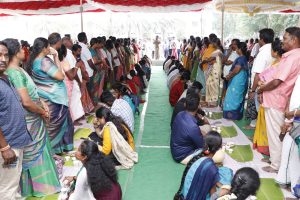
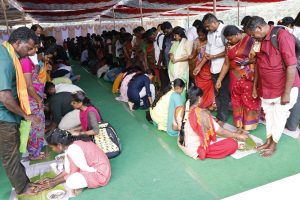
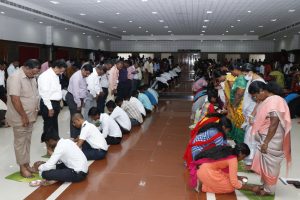
Best Practices-I
PADHA POOJA PERFORMED BY THE STUDENTS
1.1 Title of the Practice
Padha Pooja performed by the students to their parents and teachers.
1.2 Objectives of the Practice
- The distinctive point of the institution is to mould the students into a self-disciplined and respectable person in the society.
- To develop love and affection towards parents and teachers.
- To develop the habit of adherence to the elder words.
- To understand the sacrifice of their parents.
- To realize the significance of the teachers.
- To develop in to a cultured person.
- To develop moral values and ethics into the students.
- To recognize the importance of hard work and work culture.
- To share responsibilities among teachers and parents.
- To develop among themselves a sense of social and civic responsibility.
- To promote moral values and ethics in the students’ community.
- To adopt themselves into societal norms and national norms.
- To make students to understand the rights and duties as a son and as a student.
- To satisfy the expectation of the parents and teachers so as to become the economically independent individual.
1.3 The Context
The College has got its rich heritage of fostering the habit of Padha Pooja in students performed to their parents and teachers. Our country is rich in its tradition and culture. It is the responsibility of the institution to mould the personality of the students holistically and professionally for better future of the nation. The country is digitalized, and the technology plays a major role in shaping the community. The cognitive domain has been updated and improved; the affective domain is not at all given importance in the current scenario, so the children are deficient in expressing their emotions. Now the present generations of students are always engaged with the technology, they are not given importance to values like honesty, hard work, simplicity, respect, obedience and so on. Therefore, as an educational institution are temples of learning, it is very much necessary to inculcate the value system in the students for the peaceful society ahead.
1.4 The Practice
As our culture insists upon, Mathru devo bhava, Pithru Devo bhave, Acharys devo bhava and Athiti devo bhava. In order to inculcate this, Value Oriented practices such as Padha Pooja to parents during Induction programme and salutation to the teachers in the form of Padha Pooja on Teacher’s day are encouraged. Paavai Engineering College started to practice and adhere to this padha pooja, since inception of the college. It is said that the parents are the first teachers and teachers are considered to be the second parents. During inauguration of first year classes every year, all the parents of the first year students are invited. After the inaugural ceremony, the padha pooja is being done by the child of the respective parents. The parent’s feet is washed by their children and worshipped with the flowers. Parents in turn bless their children for the education and upliftment in their life. It was a heart touching sight and emotional, which makes both the children and parents in tears of joy. No child will forget that moment in their life.
Similarly, Padha pooja is being done by the students to their respective teachers on Teachers’ day Sept 5th of every year. The Teachers’ day function usually celebrated in a grand manner, where all teachers’ fraternity assemble in Aanadha Aranagam, an auditorium of 2500 seating capacity. The teachers were recognized for their performance. The final year students were called for doing Padha pooja, in the same way the teacher’s feet is washed and worshipped with flowers. Teachers profusely shower their choicest benediction to their students. It is usually an amazing glimpse to witness the situation.
1.5 Evidence of Success
By practicing this, students naturally inculcate the value of gratefulness and respect towards their parents and teachers. This practice has a great effect on students to know about the great culture and tradition of our country. This gives an insight into the act of being human and the importance of adherence to Human Values. Padha Pooja makes the students to realize the responsibility as a son, student and as a future citizen of the country. The students are able to appreciate and exhibit their respect and regard to the culture of our traditional values. Many of the students expressed that this habit has a tremendous change in their character and personality development.
Best Practices-II
OUTREACH PROGRAMMES FOR RURAL COMMUNITY DEVELOPMENT
2.1. Title of the Practice
Outreach programmes for rural community development by adopting nearby five villages, which promotes the societal responsibility of the students to evolve as a best human being.
2.2. Objectives of the Practice
- The primary focus of the institution is to transform the students into an accountable person in the
- To build rural community with sustainable
- To work with the people of rural India in identifying development challenges and evolving appropriate solutions for accelerating sustainable
- To promote the rural areas through various activities such as seminar, awareness camp, rally ,
- To mobilize and decentralized the local resources
- To understand themselves in relation to their
- To develop among themselves a sense of social and civic
- To develop competence required for group-living and sharing of
- To Gain skills in mobilizing community
- To acquire leadership qualities and democratic
- To develop capacity to meet emergencies and national
- To practice national integration and social harmony.
The underlying principle of this practice is
- To promote rural community in terms of improving their awareness in health, sanitation, livelihood and education.
- To identify the needs of the rural community and supporting them by providing various activities to develop the community.
- To make students to understand the rights and duties of the citizen and to emerge as a socially responsible citizen.
2.3. The Context
The College has got its rich heritage of fostering the habit of rendering service to the local and national community. The students are motivated to participate, involve and extend their service towards humanity. All the outreach activities are aimed to improve the holistic personality of the students. The various activities are planned and implemented through National Service Scheme (NSS) of the college. The interactions and exchange of good will of the people provide the students a sense of sympathy and empathy. The college efficiently works towards the development of the students in an academic context and also gives equal importance to these outreach activities. These training, exposure and involvement of students have provided them the experience of social living. These activities are required for every individual student to claim his/her desired attitudes. The students move towards the desired goals progressively.
2.4. The Practice
The practice of adopting five villages from the society is with the objective of cultivating ‘Service to mankind is to service to God’ in students. The villages are Natamangalam, Semmampatti, Thathayangarpatti, Erukkapalayam and Puliampatti. This practice shapes the student’s community to emanate as a problem identifier and problem solver of his or her own community. These outreach activities are carried out since the inception of the college. Paavai engineering College has National Service Scheme (NSS) team with faculty head as NSS Programme officer, with his team members. The office bearers are selected from the student representative and nominated as President, Vice-president and secretary. The whole team consists of 100 NSS volunteers. The cardinal principle of the NSS programme is that the students and teachers combined together in community service and get a sense of involvement in the tasks of nation building. From 2015 onwards there are two types of activities are organized, they are regular activities and special camp activities.
Regular activities of National Service Scheme of the college: The college has adopted five villages and service is extended to promote education of the poor, repairing schools, household survey, village survey, awareness camp on health and hygiene, road safety awareness, cleaning of the village and temples. House hold survey has been done with the objective of identifying the water facility, electricity facility, gas facility of each individual house and village survey has been done to identify the transport and road facility. The report has been submitted to the district collectorate for further action. Along with the adoption of village, NSS activities includes functional literacy and non- formal education, Tree plantation, Participate in Republic day parade, preservation and up keeping of trees, construction and repair of roads, painting of school walls, cleaning of village ponds and wells, health education and primary health care, first aid awareness, blood donation, AIDS awareness, advocating advanced agricultural practice, disaster management (Cyclones, floods), women empowerment, road safety, afforestation, blood donation, plastic eradication, and celebration of days of national importance and so on.
Special camp activities of the college: The special camp activities are conducted once in a year. The activities constitute free medical camp, talk on cyber-crime and security, programme on women empowerment, awareness rally on disposal of plastic usage, Eye check-up camp, health awareness rally, Swacch Bharat mission (Clean India Mission), awareness on following traffic rules, organic farming awareness rally, Yoga and natural medicine camp and so on. These activities are planned and implemented regularly as a part of social activities to contribute towards the betterment of the society.
The practice is unique, since it bestows the best education to the students’ community as it is participatory learning and experiential learning.
2.5. Evidence of Success
The rural community is benefitted from these programmes. The village people expressed their willingness to accept and allowed the college to conduct many programmes in their village. The students are benefitted by these activities to develop their holistic personality. The students and NSS programme officer have achieved many awards, recognition, and appreciation on account of their tireless service.
- Anna University Level Award – NSS Best Volunteer Award for consecutive years (from 2015-2022).
- Best NSS Programme Officer Award from Anna University for the year 2021-
- Republic Day Parade Camp-, New Delhi-Our students have participated in Republic Day Parade for consecutive years. (2017, 2018, 2020, 2022 and 2023).
- Two of our students have participated State Republic Day Parade-2023.
- Our students have participated in Indian Student Parliament-2022, Organized by Ministry of Youth Affairs and Sports, Government of India, Ministry of Higher & Technical Education, Maharashtra, All India Council for Technical Education (AICTE) at MIT World Peace University, Pune, Maharashtra.
- Our 8 NSS Volunteers actively participated in the National Youth Development Camp – 2022, Motivational and Learning Camp organized by Humari Udan Apno Ke Liye Seva Sansthan, Rajashan at Shri Karan Krishi Farm House, Khemli, Udaipur.
2.6. Problems Encountered and Resources Required
There are not major issues, sometimes there is a hesitation from the village people to co- operate with the NSS team. Sometimes students have conventional idea about blood donation and health related matters.
Padha Pooja to Parents and teachers.
2023
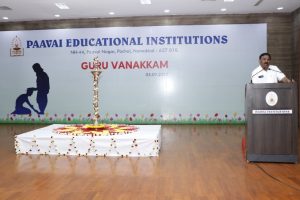
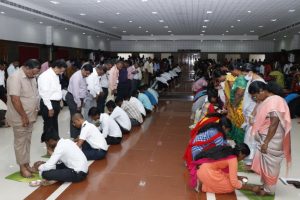
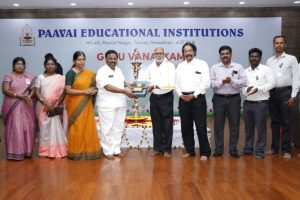
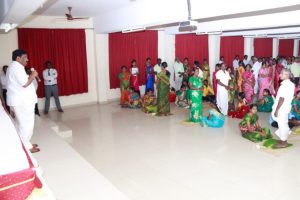
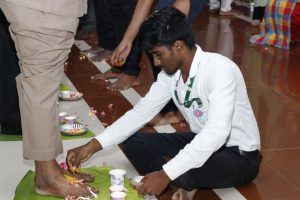
Best Practices-I
Industry Collobration
1.1 Title of the Practice
Industry Collaboration.
1.2 Objectives of the Practice
- Enhance Employability Skills:
Provide students with industry-relevant knowledge, skills, and exposure to prepare them for competitive job markets. - Hands-On Learning:
Facilitate practical learning through internships, industrial visits, and live projects in collaboration with leading companies. - Bridge Academia-Industry Gap:
Align academic curriculum with current industry practices to ensure students meet employer expectations. - Encourage Innovation:
Motivate students to work on real-time industry problems, fostering innovation and entrepreneurial thinking. - Career Opportunities:
Increase placement opportunities by building partnerships with Tier-1 and Tier-2 companies. - Up skilling Programs:
Conduct certification courses, training, and workshops in collaboration with industries to upgrade technical and soft skills. - Research Collaboration:
Encourage students to participate in collaborative research projects with industries to gain exposure to advanced technologies. - Start-up Ecosystem Support:
Foster a start-up culture by enabling access to incubation support and mentorship from industry experts. - Global Exposure:
Establish collaborations with multinational corporations to provide students with global internship and employment opportunities. - Promote Lifelong Learning:
Instill a mind-set of continuous learning through industry engagement, making students adaptive to technological advancements.
1.3 The Context
At Paavai Engineering College, the significance of bridging the gap between academia and industry is deeply acknowledged. Industry collaboration plays a pivotal role in equipping students with real-world knowledge, skills, and experience, ensuring their readiness for the competitive global workforce.
Through strategic partnerships with leading companies and industries, the institution facilitates an ecosystem where students can actively engage in industry-relevant projects, internships, and workshops. These collaborations not only enhance technical competencies but also expose students to emerging trends, cutting-edge technologies, and practical challenges faced by industries.
Additionally, industry collaboration provides opportunities for students to interact with professionals, participate in expert lectures, and work on live case studies, fostering innovation and entrepreneurial thinking. The establishment of Centers of Excellence powered by industry leaders further ensures that students receive hands-on training in advanced tools and technologies.
By embedding industry collaboration into the academic framework, Paavai Engineering College empowers students to build strong professional networks, improve employability, and align their learning outcomes with industry demands, making them future-ready engineers and innovators.
1.4 The Practice
At Paavai Engineering College, *Industry Collaboration* is a cornerstone of student development, aiming to bridge the gap between academic learning and industrial practices. The institution has established partnerships with leading industries to provide students with hands-on training, internships, and real-time exposure to cutting-edge technologies. These collaborations facilitate the establishment of industry-powered Centers of Excellence, offering students access to state-of-the-art facilities and mentorship from industry experts. Regular workshops, seminars, and guest lectures by professionals enhance students’ understanding of industry requirements and trends. Moreover, the college actively encourages students to participate in industry-sponsored projects and research initiatives, fostering innovation and entrepreneurial skills. This synergistic approach ensures that students graduate with practical knowledge and are well-prepared to meet the demands of the professional world.
1.5 Evidence of Success
The practice of Industry Collaboration at Paavai Engineering College has significantly enhanced student outcomes, providing tangible evidence of its success. Through partnerships with leading industries, students have gained access to industry-powered Centers of Excellence, enabling hands-on training with state-of-the-art tools and technologies. This collaboration has resulted in a noticeable increase in internship opportunities, both in India and abroad, ensuring students are industry-ready upon graduation. Industry-aligned workshops, seminars, and real-world project opportunities have empowered students to bridge the gap between academic learning and professional expectations. The active involvement of industry experts in mentoring students has also fostered innovation and entrepreneurial skills, reflected in the growing number of start-ups incubated by the college.
- Paavai Engineering College earned AICTE’s All India First Rank for Best Internship Record in 2023–2024 and was recognized for Outstanding Achievement for six consecutive years.
- PEC is among India’s top three engineering colleges, winning the CII Industrial Innovation Award for two consecutive years.
- Paavai Engineering College has established an Industry-Academia Collaboration, fostering partnerships with over 25 industries, startups, and organizations to promote innovation, advanced research, and comprehensive skill development.
- 138 students across various branches completed online internships offered by Taiwan universities in courses such as Mental Health, Healthy Aging, Global Health, Web Design, AI Applications in Management, and Machine Learning and 15 students have visited Asia University, Taiwan during Aug, 05 – Aug, 20, 2023 to do internship on ‘Artificial Intelligence’.
- Google Developer Student Clubs – Paavai Engineering College set a record in the India Book of Records on 13.09.23 with the event ‘Maximum Students doing Python Programming in Google Colaboratory with Social Messages.’
- IIC, EDC, and Crescent IIC jointly organized an intra-college AGRI TECH HACKATHON 2024 on 31.05.24.
- Received MSME 2.0 and 3.0 grants totaling ₹37.2 lakhs for three projects.
- Secured ₹2 lakhs in funding from AICTE for a project.
- The Aeronautical Engineering Department, in collaboration with Jet Aerospace and IIT Delhi, conducted a five-day program on Drone Technology from 19–24 January 2024.
- Shalini (III Year IT) won ₹10,000 in ‘Design Hackathon’24 for Women Engineers’ by TANCAM on 22.03.24.
- In partnership with NIELIT Calicut, PEC offered a bridge course on 3D Printing & CAD Modelling, certifying over 3,000 students, including gold recipients.
- PEC was recognized as a Mentor Institute by the Ministry of Education and AICTE, with a ₹2.25 lakh grant, and has partnerships with ISRO, NIT, Siemens, Infosys, and over 70 industries.
Best Practices-I I
Outreach Programmes For Rural Community Development
2.1. Title of the Practice
Outreach programmes for rural community development by adopting nearby five villages, which promotes the societal responsibility of the students to evolve as a best human being.
2.2. Objectives of the Practice
- The primary focus of the institution is to transform the students into an accountable person in the
- To build rural community with sustainable
- To work with the people of rural India in identifying development challenges and evolving appropriate solutions for accelerating sustainable
- To promote the rural areas through various activities such as seminar, awareness camp, rally ,
- To mobilize and decentralized the local resources
- To understand themselves in relation to their
- To develop among themselves a sense of social and civic
- To develop competence required for group-living and sharing of
- To Gain skills in mobilizing community
- To acquire leadership qualities and democratic
- To develop capacity to meet emergencies and national
- To practice national integration and social harmony.
The underlying principle of this practice is
- To promote rural community in terms of improving their awareness in health, sanitation, livelihood and education.
- To identify the needs of the rural community and supporting them by providing various activities to develop the community.
- To make students to understand the rights and duties of the citizen and to emerge as a socially responsible citizen.
2.3. The Context
The college takes pride in its rich tradition of promoting a culture of service to both the local and national communities. Students are encouraged to actively participate in outreach initiatives that foster a sense of responsibility and compassion for humanity. These activities, coordinated through the college’s National Service Scheme (NSS), are designed to nurture the holistic development of students. By engaging with the community, students develop empathy and gain valuable insights into social living. The college seamlessly integrates academic growth with outreach programs, recognizing their vital role in shaping the attitudes and character of students. Through these experiences, students acquire the skills and values necessary to achieve their personal and professional goals.
2.4. The Practice
The adoption of five villages—Natamangalam, Semmampatti, Thathayangarpatti, Erukkapalayam, and Puliampatti—aims to instill the value of “Service to mankind is service to God” in students. This initiative encourages students to become proactive members of society by identifying and solving problems within their communities. Since its inception, Paavai Engineering College has been conducting outreach activities under the National Service Scheme (NSS). The NSS team comprises a faculty head serving as the Programme Officer, supported by student office bearers, including the President, Vice-President, and Secretary, along with 100 dedicated volunteers. The core philosophy of the NSS program lies in fostering collaboration between students and faculty in community service, creating a shared sense of responsibility toward nation-building. Since 2015, the NSS has organized two types of activities: regular events and special camp programs.
Regular activities of National Service Scheme of the college: The College has adopted five villages, extending services to uplift the underprivileged through initiatives such as promoting education, repairing schools, conducting household and village surveys, organizing health and hygiene awareness camps, raising road safety awareness, and undertaking cleaning activities in villages and temples. The household surveys aim to assess water, electricity, and gas facilities in individual homes, while village surveys evaluate transport and road infrastructure. Reports of these findings have been submitted to the district collectorate for necessary action.
Additionally, NSS activities encompass a wide range of community-focused efforts, including functional literacy and non-formal education, tree plantation, participation in Republic Day parades, maintenance of trees, road construction and repair, school wall painting, cleaning of village ponds and wells, health education, primary health care, first aid training, blood donation drives, AIDS awareness programs, promotion of advanced agricultural practices, disaster management (cyclones and floods), women empowerment initiatives, road safety campaigns, afforestation, plastic eradication, and observance of days of national significance.
Special camp activities of the college: The special camp activities are organized annually and encompass a variety of initiatives, including free medical camps, sessions on cyber-crime and security, programs promoting women empowerment, awareness rallies on plastic disposal, eye check-up camps, health awareness drives, Swachh Bharat Mission (Clean India Mission) activities, campaigns on traffic rule adherence, organic farming awareness rallies, and Yoga and natural medicine workshops, among others. These activities are systematically planned and executed as part of social responsibility efforts aimed at societal improvement.
This practice is distinctive as it provides students with a comprehensive educational experience through participatory and experiential learning methods.
2.5. Evidence of Success
The rural community has greatly benefited from these initiatives. The villagers have shown enthusiasm and support, allowing the college to organize numerous programs in their locality. These activities have also helped students enhance their holistic development. As a result of their dedicated efforts, the students and the NSS programme officer have received numerous awards, recognition, and appreciation.
- Anna University Level Award: Received the NSS Best Volunteer Award for an impressive streak of consecutive years from 2015 to 2024.
- Best Blood Donation Camp Organizer Appreciation Award: Awarded to our NSS Programme Officer for the Best Blood Donation Camp Organizer Appreciation Award (2022-23).
- Republic Day Parade Participation: Our students have consistently represented the institution in the Republic Day Parade in New Delhi during the years 2017, 2018, 2020, 2022, 2023, and 2024.
- State Republic Day Parade: Two students participated in the State Republic Day Parade in 2024.
- National Adventure Camp: Five NSS volunteers actively took part in the National Adventure Camp 2023, organized by Humari Udan Seva Sasthan from October 1 to October 5, 2023, in Sirohi, Rajasthan. They enthusiastically engaged in various adventure activities during the camp.
- National Voters Day Celebration: On January 25, 2024, NSS Programme Officer C. Rathnakumar received the Best Performing Nodal Officer Award, while R. Gokul, a third-year B.E. (Cyber Security) student, was recognized as the Best Performing Campus Ambassador for 2024. Both received accolades from Thiru. Satyabrata Sahoo, I.A.S., Chief Electoral Officer (CEO) and Principal Secretary to the Tamil Nadu Government. The event, presided over by the Honorable Governor of Tamil Nadu Thiru R.N. Ravi, was held at Kalaivanar Arangam, Chennai.
2.6. Problems Encountered and Resources Required
There are not major issues, sometimes there is a hesitation from the village people to co- operate with the NSS team. Sometimes students have conventional idea about blood donation and health related matters.
Institutions Distinctiveness
Our college always adopts uniqueness in moulding the personality of the students by following its own Distinctiveness, Christened as “Mandatory registration for internships for all the students”.
The main objective of this internship is to transform the students’ community into economically independent citizens. This is unique, because it is adopted under the principle, “Earn while you learn”.
During this Covid-19, pandemic situation, the college has made its sincere attempt to make all students to register for internships through Internshala. The total number of students got selected for their respective companies are 2387 in the year 2020-2021.
The selected student gets stipend for internship. In Paavai Engineering College, there are totally4699 students are registered and overall3758 students got selected for internships in the respective companies including industrial internship. The students’ community avail these opportunities provided by the college and enjoy the benefit of getting stipend to ensure the social security. It motivates the student to be self-supporting.
Paavai Engineering College has received All India level First Rank – Best Internship Record during Internship day on 25.8.2021 jointly organised by AICTE and Internshala and it was awarded by Prof. Anil Sahasrabudhe, Chairman, AICTE, New Delhi. Paavai Engineering College has received outstanding achievement award for securing All India Rank 1 for the academic year 2021.
Many students have evolved as an app developer, software developer, programmer and an entrepreneur.
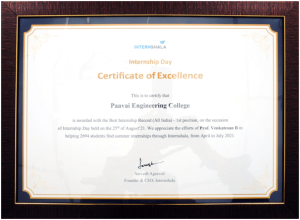
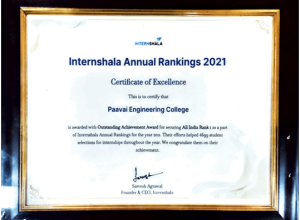
Our college always adopts uniqueness in moulding the personality of the students by following its own Distinctiveness, Christened as “Mandatory registration for internships for all the students”.
The main objective of this internship is to transform the students’ community into economically independent citizens. This is unique, because it is adopted under the principle, “Earn while you learn”.
The college has made its sincere attempt to make all students to register for internships through Internshala. In the academic year 2021–2022, our students received 9370 internship offers in total from the various companies.
The selected student gets stipend for internship. In Paavai Engineering College, there are totally 3655 students are registered and overall 2574 students got selected for internships in the respective companies including industrial internship. The students’ community avail these opportunities provided by the college and enjoy the benefit of getting stipend to ensure the social security. It motivates the student to be self-supporting.
Paavai Engineering College has received All India level First Rank – Best Internship Record during Internship day on 25.8.2022 jointly organised by AICTE and Internshala and it was awarded by Prof. Anil Sahasrabudhe, Chairman, AICTE, New Delhi. Paavai Engineering College has received outstanding achievement award for securing All India Rank 1 for the academic year 2021-2022.
Many students have evolved as an app developer, software developer, programmer and an entrepreneur.
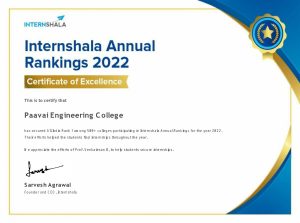
Our college always adopts uniqueness in moulding the personality of the students by following its own Distinctiveness, Christened as “Mandatory registration for internships for all the students”.
The main objective of this internship is to transform the students’ community into economically independent citizens. This is unique, because it is adopted under the principle, “Earn while you learn”.
The college has made its sincere attempt to make all students to register for internships through Internshala. In the academic year 2022–2023, our students received 1858 internship offers in total from the various companies.
The selected student gets stipend for internship. In Paavai Engineering College, there are totally 4125 students are registered and overall 830 students got selected for internships in the respective companies including industrial internship. The students’ community avail these opportunities provided by the college and enjoy the benefit of getting stipend to ensure the social security. It motivates the student to be self-supporting.
Paavai Engineering College has received All India level First Rank – Best Internship Record during Internship day on 23.01.2024 jointly organised by AICTE and Internshala and it was awarded by Shri. Sarvesh Agarwal, Founder and CEO, Internshala, New Delhi. Paavai Engineering College has received outstanding achievement award for securing All India Rank 1 for the academic year 2022-2023.
Many students have evolved as an app developer, software developer, programmer and an entrepreneur.
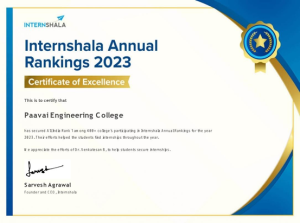
Our college always adopts uniqueness in moulding the personality of the students by following its own Distinctiveness, Christened as “Mandatory registration for internships for all the students”.
The main objective of this internship is to transform the students’ community into economically independent citizens. This is unique, because it is adopted under the principle, “Earn while you learn”.
The college has taken conscientious efforts to encourage all students to sign up for internships through Internshala. Our students were offered internships by a total of 71 various companies during the 2023–2024 academic year.
The selected students get stipend for internship. In Paavai Engineering College, there are totally 4108 students who are registered and overall 913 students got selected for internships in the respective companies including industrial internships. The student community avail these opportunities provided by the college and enjoy the benefits of getting stipend to ensure the social security. This motivates the students to be self-supporting.
Paavai Engineering College was recognized by Shri. Sarvesh Agarwal, Founder and CEO of Internshala, New Delhi, with the All India level First Rank – Best Internship Record on Internship Day on 23.01.2024, which was organized in collaboration with AICTE. As Paavai Engineering College achieved All India Rank 1 for the 2023–2024 academic year, they were recognized with an Outstanding Achievement Award consecutively for six years.
Many students have evolved as an app developer, software developer, programmer and an entrepreneur.

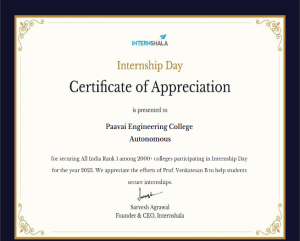
Academic Audit Report
External Academic Audit Report |
|
| S.No. | Year |
| 1 | 2022 – 2023 |
| 2 | 2021 – 2022 |
| 3 | 2020 – 2021 |
| 4 | 2019 – 2020 |
| 5 | 2018 – 2019 |
| 6 | 2017 – 2018 |
| 7 | 2016 – 2017 |
| 8 | 2015 – 2016 |
Student Satisfaction Survey
Strategic Planning and Process
IQAC Minutes & Action Taken
IQAC Annual Report
IQAC Annual Report | |
| S.No. | Year |
| 1 | 2023 – 2024 |
| 2 | 2022 – 2023 |
| 3 | 2019 – 2020 |
| 4 | 2018 – 2019 |
| 5 | 2017 – 2018 |
| 6 | 2016 – 2017 |
| 7 | 2015 – 2016 |
| 8 | Continuous Improvement |

